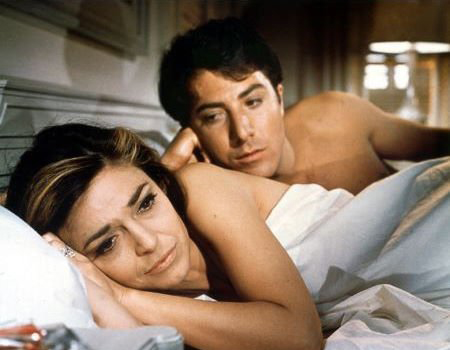Reviews of Classic Movies: 'The Graduate'
In honour of Dustin Hoffman’s 74th birthday yesterday, I’ve decided to kick off my ongoing series of classic movie reviews with Hoffman’s big break: The Graduate. I recently included the movie on my list of 5 classic films you need to see as soon as possible, but I thought I should into more detail here about why I think it’s so important to watch.
Of course, you can go back and read reviews written when the movie came out. It struck me, though, that it would be a cool experiment to write my own review now, in an effort to explore what the film accomplished when it was released and the effect it has on a modern viewer like me. I’m convinced that The Graduate is an essential part of a complete film “education” – but read on for my full review, and a chance to leave your reaction in the comments section!
As I mentioned, The Graduate stars Dustin Hoffman in the lead role of Benjamin Braddock, a disillusioned college graduate returning home to California to spend the summer with his family. Ben is deeply troubled by his future; he doesn’t know what he wants to do with his life, and feels pressured by his parents and parents' friends to decide on something immediately. At his graduation party, he is introduced to Mrs. Robinson, the wife of his father’s business partner. When Mrs. Robinson asks Ben to drive her home, Ben is slowly seduced by the older woman, an event that forces Ben to come of age in a tumultuous and painful way.
Dustin Hoffman’s portrayal of Ben Braddock is one of the early hooks of The Graduate. Hoffman’s performance captures the uneasy, stressed post-grad that we have all been or will be at some point in our lives. We can all sympathize with him, and we want to see him do well. Therefore, Ben’s dalliance with Mrs. Robinson becomes a dangerous distraction for Ben: few of his parents’ friends would be interested in hiring him if the affair was exposed. Ben is unfortunately caught up in the excitement of his new “adventure” and eventually realizes the ramifications of the affair much too late.
Anne Bancroft is also notable for her performance as Mrs. Robinson – even though Bancroft was only six years older than Hoffman, she convincingly plays a woman 20-30 years older than Ben. Part of what makes her character’s affair with Ben risky is how she isn’t interested in forming an emotional connection with Ben; she simply wants to bed a younger man while keeping her public image intact. This desire eventually chafes against Ben’s personality: he wants to get to know Mrs. Robinson, and her disinterest causes him to become attracted to Mrs. Robinson’s daughter, Elaine.
The twisted mother-daughter love triangle that results is where the plot of the film really gets going. Faced with competition from her own daughter, Mrs. Robinson becomes fiercely jealous and fearful for her reputation – leading her to persecute Ben in an effort to at once maintain her dominance and ruin her ex-lover.
[youtube=http://www.youtube.com/watch?v=-3lKbMBab18]
One thing I noticed immediately about The Graduate was the way it’s edited. There are some brilliant scene transitions in the film, which not only efficiently move the story forward, but tie in perfectly with the themes of the film. At one point, when Ben is deep into the affair with Mrs. Robinson, the film cuts from Ben sitting down to watch TV to a near-identical shot of him relaxing after an encounter with Mrs. Robinson. These two different locations seamlessly meld together to convey both the passage of time in the relationship and Ben’s growing indifference.
Another great transition is a cut between Ben hoisting himself onto an inflatable pool cushion and Ben heaving himself onto Mrs. Robinson in a hotel bed. This cut equates Mrs. Robinson with an inanimate pool toy, a summer distraction devoid of emotion. It’s a piece of the film’s construction that communicates more in half a second than an entire scene of dialogue. These editing choices are a smart way to tell a story, using the film medium to directly complement the writing and acting.
The cinematography works in the same way. Sweeping establishing shots of the California landscape (set to a fantastic score by Simon & Garfunkel) show Ben winding his way through the countryside in his Alfa Romeo, as he tries to fix his derailed life. Other camera movements are more subtle. My favourite was the scene where Elaine Robinson finally finds out about Ben’s relationship with her mother. Ben says nothing, but as Elaine remains puzzled, the camera remains out of focus on her face; as she begins to understand what has happened, the camera slowly focuses on her face in time with the realization. Again, the camera is visually contributing to the story in way that isn't seen that often in movies.
The great thing about watching movies like The Graduate for the first time, forty or more years after their release, is the sudden appreciation you have for their pop-culture legacy. In the case of this film, I suddenly understood the term “Mrs. Robinson” as it is used to describe older women who seduce younger men. I also finally grasped all the pop-culture references to Ben’s famous line “You’re trying to seduce me” and its pairing with the shot under Mrs. Robinson’s leg. Pardon the cliché, but it was like finding a pivotal piece of the large puzzle that is film history: the larger historical web of actors, characters and stories abruptly became much clearer.
I originally debated whether it makes sense to award films in my “classic movie reviews” series a score out of four stars. After all, The Graduate has likely received hundreds of four-star reviews over the years. But if the four-star scale works in the way Roger Ebert argues it does, then I might as well come up with one, because it’s how many people decide whether or not to see something. The Graduate gets three-and-a-half stars out of four: even 43 years after its release, it remains entertaining, dramatic and eye-opening on a number of creative levels.
-
What do you think about my review of The Graduate? If you’ve never seen it, will you go check it out? If you are familiar with the movie, did I do it justice? I’d also like to hear what you think about my idea to review classic films. Want to see more? Have any favourites you’d like me to review? Leave your comments below, and if you're so inclined, check out my archive of film reviews and commentary below!



